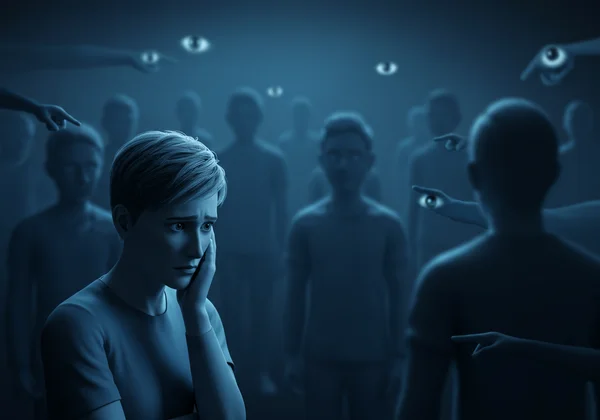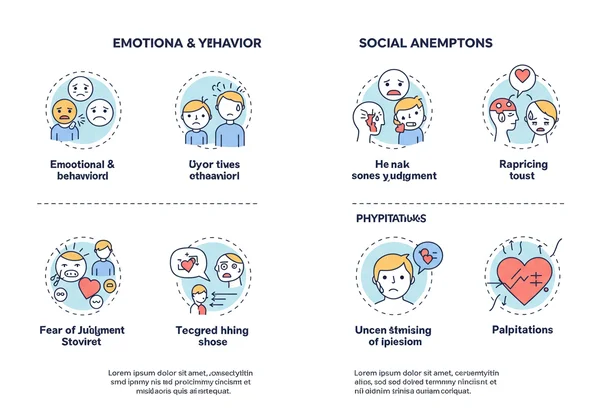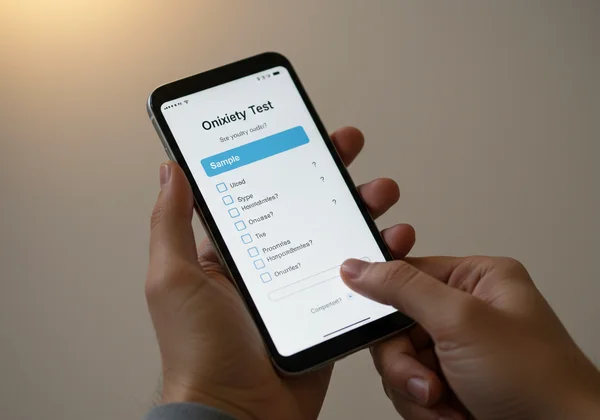Social Anxiety Test: Signs, Symptoms & Coping Tips
August 17, 2025 | By Isla Caldwell
Does your heart pound at the thought of a team meeting? Do you find yourself making excuses to skip social events, even ones you genuinely want to attend? Feeling a bit nervous in social settings is normal, but when that nervousness becomes an overwhelming fear, it might be more than just shyness. Many people find themselves wondering, do I have anxiety or am I just stressed? If this sounds familiar, you're not alone, and understanding these feelings is the first step toward managing them.
This guide is here to help you explore the world of social anxiety. We'll walk through its common signs, explain how a social anxiety test can provide clarity, and share practical, actionable tips to help you feel more at ease. Gaining insight is a powerful tool, and a great place to start is with a free, confidential anxiety test that can offer a valuable perspective on what you're experiencing.
What Is Social Anxiety Disorder (SAD)?
Social Anxiety Disorder (SAD), sometimes called social phobia, is more than just feeling shy. It’s an intense, persistent fear of being watched and judged by others. This fear can be so severe that it affects your work, school, and other day-to-day activities. It can make it incredibly difficult to build and maintain relationships, leaving you feeling isolated.

For someone with social anxiety, everyday social interactions can cause significant distress. This could include anything from making small talk with a cashier and eating in front of others to speaking up in a meeting or attending a party. The core of this anxiety disorder is a deep-seated fear of embarrassing yourself, being seen as awkward, or being negatively evaluated. Understanding the specific symptoms is crucial for recognizing if this is what you're facing.
Key Physical and Emotional Social Anxiety Symptoms
The experience of social anxiety is both emotional and physical. The dread of a social event can begin weeks in advance, and the symptoms during a situation can feel overwhelming. Recognizing these signs is a key part of self-assessment.
Emotional & Behavioral Symptoms:
- Intense fear of judgment: A constant worry that you will humiliate or embarrass yourself.
- Worrying about social events for days or weeks beforehand: This anticipatory anxiety can be exhausting.
- Avoidance behavior: Actively steering clear of social situations where you might be the center of attention.
- Fear of talking to strangers: Difficulty initiating conversations or making eye contact.
- Analyzing your performance after a social situation: Ruminating on your interactions and finding flaws.
Physical Symptoms:
-
Blushing or flushing
-
A racing heart or palpitations
-
Trembling or shaking
-
Sweating
-
Upset stomach or nausea
-
Feeling short of breath
-
Dizziness or lightheadedness

These physical reactions are your body’s “fight or flight” response kicking in, but in a situation that isn’t actually life-threatening. They can be so uncomfortable that they reinforce the desire to avoid social situations altogether, creating a difficult cycle.
How is Social Anxiety Different from Shyness?
This is a critical distinction to make. While shyness and social anxiety can look similar on the surface, their impact on a person's life is vastly different. Shyness is a personality trait. A shy person might feel uneasy around new people but can generally warm up over time. Their discomfort is usually short-lived and doesn't disrupt their life in a major way.
Social Anxiety Disorder, on the other hand, is a mental health condition that causes significant impairment. The fear and anxiety are out of proportion to the actual situation and can lead to complete avoidance of social contact. This avoidance can interfere with education, career advancement, and personal relationships, causing immense distress. If you feel your social fears are holding you back, taking an anxiety assessment test can be a helpful next step.
Using a Social Anxiety Test for Self-Assessment
If the symptoms and descriptions above resonate with you, you might be wondering what to do next. A formal diagnosis must come from a qualified healthcare professional, but a self-assessment can be an incredibly empowering first step. It provides a private, pressure-free way to quantify your feelings and gain objective insight into your anxiety level.
An online anxiety test can act as a mirror, reflecting patterns that you might not have fully recognized. It’s not about labeling yourself but about understanding yourself better. For many, seeing their feelings represented in a score can be validating and motivate them to seek further support or try new coping strategies.
How Our Confidential Online Test Works
We understand that privacy and trust are paramount, especially when exploring sensitive topics like mental health. That’s why our online tool is designed to be completely confidential and anonymous. There's no need to register or provide any personal information. Our test is based on clinically validated screening scales like the GAD-7, ensuring the questions are relevant and meaningful.
The process is simple and quick—it takes less than three minutes to complete. You'll answer a series of questions about how you've been feeling recently. Immediately after, you’ll receive a score that helps you understand the severity of your symptoms. For those seeking deeper insight, we offer a unique, AI-powered analysis that provides a personalized report on your strengths, challenges, and actionable next steps. You can try our free tool anytime.

Understanding Your Anxiety Score
Receiving your results is just the beginning. Your anxiety score will typically be categorized as low, moderate, or high. This score is a snapshot, not a definitive diagnosis. It's a tool to help you gauge where you are right now.
- Low Score: You may be experiencing normal levels of stress or shyness, but not significant anxiety symptoms.
- Moderate Score: This suggests you are experiencing symptoms consistent with an anxiety disorder that may be impacting your quality of life. It’s a good indicator that learning coping skills could be very beneficial.
- High Score: A high score indicates that your symptoms are likely severe and causing significant distress. This is a strong signal that it would be wise to speak with a doctor or mental health professional.
No matter your score, this information is for you. It can be a starting point for self-reflection or a concrete piece of data to share with a professional, helping you have a more productive conversation about your mental health. Ready to check your score?
How to Cope with Social Anxiety and Social Phobia
Knowledge is power, and so are practical tools. Managing social anxiety, or social phobia, involves a combination of in-the-moment techniques and long-term strategies to build resilience and confidence. Here are some effective methods you can start using today.

In-the-Moment Grounding Techniques
When you feel a wave of panic or anxiety in a social situation, grounding techniques can bring you back to the present moment and calm your nervous system.
- The 5-4-3-2-1 Method: Look around and name 5 things you can see, 4 things you can feel (like your feet on the floor or the texture of your shirt), 3 things you can hear, 2 things you can smell, and 1 thing you can taste. This pulls your focus away from your anxious thoughts.
- Focused Breathing: Inhale slowly through your nose for four counts, hold your breath for four counts, and exhale slowly through your mouth for six counts. This simple act can lower your heart rate and signal to your brain that it's safe to relax.
Long-Term Strategies for Building Confidence
Lasting change comes from building new habits and thought patterns. These strategies, often based on principles of Cognitive Behavioral Therapy (CBT), can help you gradually reduce the hold social anxiety has on you.
- Challenge Negative Thought Patterns: Social anxiety thrives on negative predictions ("Everyone will think I'm boring"). When you have these thoughts, challenge them. Ask yourself: "What's the evidence for that? What's a more realistic outcome?"
- Start Small with Social Exposure: Avoiding social situations only makes the fear bigger. Instead, gradually face your fears in manageable steps. Start by making eye contact with a cashier, then progress to asking a stranger for directions. Each small victory builds confidence.
- Focus Outward, Not Inward: In social situations, anxious people tend to focus on themselves and their perceived flaws. Try to shift your focus to the people you're with and the conversation you're having. Listen actively. This takes the spotlight off your anxiety.
You’ve just taken a powerful step: learning to recognize the signs of social anxiety. This isn't about being the life of the party—it's about feeling free to participate in your own life without fear holding you back. The knowledge you have now is the foundation for building real confidence.
If you're ready for more clarity, a confidential social anxiety test can offer the validation and insight you need to move forward. Consider it your private, supportive first step on the path to well-being.
Disclaimer: This article is for informational purposes only and does not constitute medical advice. Our test is a screening tool, not a diagnostic instrument. Please consult a qualified healthcare professional for any health concerns or before making any decisions related to your health.
Ready to take that first step? Get instant insight on our homepage. We invite you to explore, learn, and start your path toward greater well-being today.
Frequently Asked Questions About Social Anxiety
How can I test myself for social anxiety?
A great way to test yourself for social anxiety is by using a reliable, confidential screening tool. An online anxiety test based on scientific scales like the GAD-7 can give you an objective score reflecting your symptom severity. This helps you understand your feelings better and can be a great starting point for a conversation with a healthcare provider. You can take the test now on our website.
What are the 5 main signs of social anxiety?
While symptoms vary, five common signs include: 1) Intense fear of being judged or scrutinized in social situations. 2) Significant avoidance of social gatherings or performance situations. 3) Experiencing physical symptoms like blushing, sweating, or a racing heart during social interactions. 4) Spending time after a social event worrying excessively about how you acted. 5) Having the fear and anxiety significantly interfere with your daily routine, work, or relationships.
Can social anxiety be managed without medication?
Yes, for many people, social anxiety can be effectively managed without medication. Therapies like Cognitive Behavioral Therapy (CBT) are highly effective at teaching people to challenge negative thought patterns and gradually face feared situations. Lifestyle changes, mindfulness, and practical coping strategies like the ones mentioned in this article can also make a significant difference. However, for some individuals, medication prescribed by a doctor can be a helpful part of a comprehensive treatment plan.